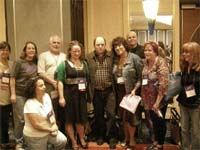 Have you ever been randomly chosen from a circle of adults to create a monologue on the spot? Have you ever had to convey the text of a Greek myth without saying a word? Or maybe, you have been asked to create a documentary drama in two hours with a group of strangers? That was the nature of the “Power of Leadership” theatre conference that I attended in Anaheim, California, recently. Hosted by the Educational Theatre Association of America (EDTA), this professional development opportunity offered hands-on workshops ranging from commedia dell’ arte, how to create a documentary drama, Disney costuming secrets, to even a master’s class in the Michael Chekhov psychological gesture technique.
Have you ever been randomly chosen from a circle of adults to create a monologue on the spot? Have you ever had to convey the text of a Greek myth without saying a word? Or maybe, you have been asked to create a documentary drama in two hours with a group of strangers? That was the nature of the “Power of Leadership” theatre conference that I attended in Anaheim, California, recently. Hosted by the Educational Theatre Association of America (EDTA), this professional development opportunity offered hands-on workshops ranging from commedia dell’ arte, how to create a documentary drama, Disney costuming secrets, to even a master’s class in the Michael Chekhov psychological gesture technique.
As an educator, these conferences offer many benefits. Firstly, I become a student again. I am able to learn new teaching and acting techniques from world class, international instructors. These workshops reawaken the sense of being a student and enhance the curiosity, excitement and apprehension that come from taking a risk and trying something new. This keeps me current and enables me to understand the perspective of my LCC students.
As a result, this experience helps my students in that the curriculum is in infused with fresh new ideas. This year, we will explore the art of Italian comedy through the mask work of commedia dell’ arte in my grade 10 theatre arts class. In grade 9 theatre, I will incorporate the “monologue orchestra” as part of my acting unit.
Secondly, since I find myself surrounded by like-minded thespians, these conferences provide an invaluable support network in my field of expertise. I have always been the only teacher in my field in all of the schools in which I taught. This networking time is therefore important for me because it helps situate my work within a larger community. We are all setting out with the same objectives, passionate about theatre education and are creative observers of the human condition.
Thirdly, each conference has a keynote speaker whose task is to inspire and mobilize new ideas and passions in theatre education. This year’s keynote speaker was Jason Alexander who is best known for his character, George Costanza, on Seinfeld. Not only is Jason Alexander a gifted actor, he is also an intelligent writer and director who has a lot to say about leadership in the arts. He sits on an advisory board for the arts at Boston University and has a compelling argument for theatre education. He highlighted new research that shows how theatre, music and art stimulates and develops the right side of the brain. Secondly he conveyed the notion that it is the artists’ job to go against that which has been established in order to create something new. Experimentation, creativity, risk taking as well as understanding your culture and critiquing it, is a profound way in which the arts shapes us to become more evolved human beings.
—Natasha Hart, LCC Department Head of Fine Arts
